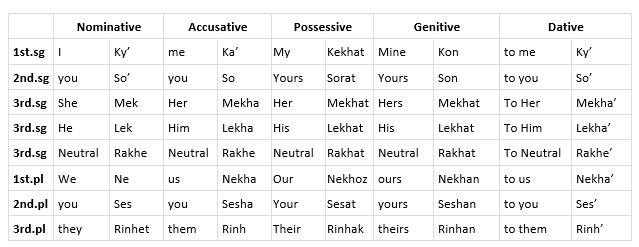Ahknan
Geographical Distribution
Phonology
Morphology
Syllable structure: (C)(I)(V)
Stress pattern: Initial — stress is on the first syllable, unless the 'h' indicator is present, then the stress comes on whatever is after that letter
Word Consonants: b, d, f, j, g, k, l, m, n, p, r, s, t, v, w, z, ɟ, ɫ, ɾ, ʃ, ʒ, ɕ, ʑ, aɪə
Word Affricates: t͡ʃ, t͡ɕ, ʈ͡ʂ, d͡z, d͡ʒ, d͡ʑ, ɖ͡ʐ, tʃ
Word Vowels: e, ʌ, ʊ, ɒ, ə, i:, ɔ:, ɑ:, u:, eɪ, aɪ, ɜː, ɛ, ɔ, œ, y, əʊ
Syntax
In Ahknan, the person being addressed is almost always placed at the front of the sentence, no matter who or what the subject is. For example, in English, we might say, "I dislike that," but in Ahknan, it's be Ky'na sek, which directly translates to "I that hate." Pronouns are often pushed together in conjunctions, but almost never are pronouns pushed with verbs, unless its the object of the phrase pushed with the action being done to it, but that typically only occurs in more complex sentences, where the context would be confusing if not done otherwise. Or, it can be used in slang by people to cut down sentences to their bare essentials (Ex: Changing "Are you okay?" to "Okay?")
Ahknan relies heavily on context, rather than tone. The glotteral tone used mostly for questions is not so pronounced, leaving the interpretation to the situation. Often times, questions are simply abbreviated to their shortest possible forms. For example, the question, "What's wrong with you?":
What's wrong with you? - So'ter dakt'se jusher? (Direct: You with what is wrong?)
You're wrong? - So'raen('ter) jusher? (Direct: You are with wrong?)
You wrong? - Dakt so'jusher? (Direct: What you wrong?)
Alternatively, the question can be simply conveyed by saying "jusher" or "so jusher" with the right tone at someone.
Vocabulary
- Akro::Hail
- Ahknava::Greetings
- Ikvea::Farewell
- Sana son aban ishael::May your strength stay
- So'ses sesba::You did well
- Na'fakohkna::Desert-dweller (insult)
- So'do poraste Ahknagh?::Do you speak Ahknan?
- Ibah::Elder
- Siba!/Shivat!::Have at thee!/Have at thee! (derogatory)
- Azaya - Mojocki, "Sand flower"
- Telhath - Tahnsakhi "Healer"
- Meyarakh - Cascan "Lover"
- Bash - Old Mojocki "Courageous one"
- Hetham - Old Mojocki "Heth lives"
- Ataloh - Old Mojocki "Leader"
- Jirka - Mojocki "Warrior"
- Bhat - Mojocki-Hatchani "Potter"
- Kelkhatra - Kenatani "Noble hunter"
- Sobakon - Cascan "Son of strength"
- Syhana - Cascan "Syhana flower"
- Jirka - Mojocki "Warrior"
- Tahla - Mojocki "Scholar"
- Atcha - Hatchani "Brave"
- Esiran - Sanorhi "Smart hunter"
Remove these ads. Join the Worldbuilders Guild










Comments